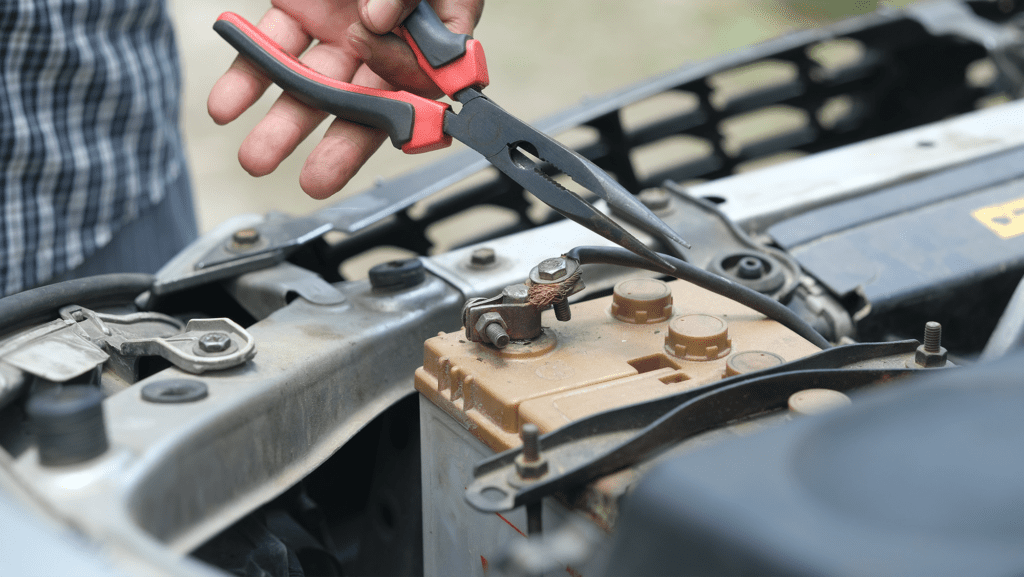Did you know that the average car battery life span is only about 3 to 5 years? That’s right! The life of your car battery largely depends on the conditions it operates in, how often you drive, and the manner in which you drive.
This guide aims to deliver comprehensive knowledge about the “car battery,” helping you understand its workings, make informed purchasing decisions, and ensure its long-lasting performance.
Understanding the Car Battery
The car battery is an essential component of a vehicle, powering all electrical systems and features. It plays a pivotal role in starting the car, providing the necessary power to ignite the engine and keep the electronics running.
How does a car battery work?
A car battery operates on a simple yet fascinating chemical process. It converts chemical energy into electrical energy. This transformation happens through a reaction between the sulfuric acid solution (electrolyte) and lead plates inside the battery. The energy produced is used to start the car and power its electrical components.
Types of car battery
Car batteries come in different types, each designed to meet specific needs and applications:
- Lead Acid Batteries: These are the most common type of car batteries, known for their affordability and reliable performance.
- AGM (Absorbent Glass Mat) Batteries: AGM batteries offer superior power and longevity, making them ideal for modern vehicles with advanced electrical systems.
- Deep Cycle Batteries: Unlike regular starter batteries, deep cycle batteries are designed to provide power over a longer period, suitable for RVs and marine applications.
Car battery size
Car batteries come in various sizes, referred to as ‘group sizes.’ The group size indicates the battery’s physical dimensions and terminal locations. It’s crucial to choose the correct group size for your car to ensure a perfect fit and optimal performance. A battery that’s too small may not have enough power to start your vehicle, while a battery that’s too large might not fit properly in the designated space. Here are some tips on how to choose the right battery size for your car:
- Check Your Vehicle’s Manual: The easiest way to figure out what size battery you need is by checking your vehicle’s owner’s manual. It will provide the specific requirements for the battery, including its size.
- Consider the Battery Group Size: Batteries are categorized into group sizes which indicate their length, width, and height. The group size you need will depend on your vehicle make and model.
- Understand the Power Requirements: Different vehicles require different amounts of power to start and run efficiently. Make sure the battery you choose has the necessary Cold Cranking Amps (CCA) and Reserve Capacity (RC) to meet your vehicle’s needs.
- Consult a Professional: If you’re still unsure about the right battery size, consult a professional. They can guide you based on their knowledge and experience with similar vehicles.
- Buy from a Reputable Brand: Reputable brands are more likely to provide accurate and reliable information about battery size and compatibility.
- Ensure Proper Fit: Even if a battery is technically the correct size, it might not fit properly due to the position of the terminals or the type of casing. Always ensure the battery fits securely and the terminals are in the correct position before purchasing.
Choosing the right battery size is just one aspect of selecting a car battery. You should also consider factors like the battery type (e.g., lead-acid, AGM, etc.), warranty, and expected life span when making your decision.
Top 5 car battery brands
With numerous brands offering car batteries, it can be challenging to decide which one offers the best value for your money. Here are the top five brands known for their performance, durability, and customer satisfaction:
- Optima Batteries
- Exide
- Bosch
- Delphi
- DieHard
Car battery price
The price of a car battery varies based on its type, brand, size, and power. On average, a new car battery can cost anywhere from $50 for a basic lead-acid battery to $300 for a premium AGM battery.
Buy a Perfect Battery for Your Car
Choosing the right battery for your car is vital to ensure optimal performance and longevity. When selecting a car battery, consider the following factors:
- Vehicle Requirements: Check your vehicle’s manual for specific battery requirements.
- Power Requirement: Choose a battery with enough cranking amps to start your vehicle in any weather condition.
- Battery Life: Look for batteries with a high reserve capacity and long warranties.
- Maintenance: Decide between low-maintenance (periodic topping up of electrolyte) and maintenance-free batteries.
Car battery buying tips
Car batteries are the silent powerhouses that keep your vehicle running smoothly. Here are some useful tips to help you make an informed purchase:
- Always check the manufacturing date of the battery: Fresh batteries are always the best. Batteries have a shelf life, and it’s crucial to pick one that is no more than six months old. The date is often coded, where the letter represents the month (A for January, B for February, etc.), and the number represents the year.
- Consider the battery’s reserve capacity: The reserve capacity of a battery indicates how long it can run on its power if the car’s alternator fails. This is an important consideration, especially if you use a lot of electronic features in your car or live in a colder area where batteries have to work harder.
- Don’t go for cheap batteries: While it may seem cost-effective initially, cheaper batteries may not be durable and could end up costing you more in the long run. They often have shorter warranties and lifespan. Instead, consider investing in a good quality battery from a reputable brand.
- Understand your vehicle’s power requirements: Different vehicles have different power needs. Make sure the battery you choose has enough Cold Cranking Amps (CCA) to start your vehicle in cold weather. Also, consider the power needed for other electrical components in your car.
- Check the battery type: There are several types of car batteries – conventional lead-acid batteries, Absorbed Glass Mat (AGM), and lithium-ion batteries. Each has its own advantages and disadvantages, so choose the one that best suits your driving habits and vehicle’s requirements.
- Recycle your old battery: Car batteries contain materials that can be harmful to the environment. Many retailers offer recycling programs when you buy a new battery. It’s a simple step that makes a big difference.
Choosing the right car battery involves considering various factors beyond just the price. It’s about understanding your vehicle’s needs, the battery’s freshness, capacity, type, and the environmental impact of your choice. Making an informed decision can ensure your vehicle runs smoothly and efficiently, saving you from potential hassles down the line.
Take Care of Your Car Battery
A car battery typically lasts between 3 to 5 years. However, this lifespan can be significantly extended with proper care and maintenance. Proper care and maintenance can significantly extend the life of your car battery.
- To prolong your battery’s life, avoid short rides, keep the battery clean, and ensure it’s always fully charged. Also, limit the usage of electronics when the engine is off to prevent unnecessary battery drain.
- Regular charging is vital to maintain the battery’s health. If you don’t frequently use your car, consider using a battery charger to keep your battery at optimal charge levels.
- Be mindful of the signs of a dead battery. A dead battery can be a driver’s worst nightmare. Signs of a dying battery include difficulty in starting the vehicle, dimming headlights, and a noticeable drop in the performance of electrical components. If you notice these signs, it’s essential to get your battery tested by a professional and replaced if necessary to avoid being stranded or causing damage to your vehicle’s electrical system.
Taking care of your car battery is a key aspect of overall vehicle maintenance. Proper care, including regular charging, avoiding short rides, limiting the use of electronics when the engine is off, and keeping the battery clean can significantly prolong its lifespan. Being aware of the signs of a dead or dying battery allows for timely intervention, preventing potential inconvenience or damage. Remember, your car battery is the heart of your vehicle’s electrical system – treat it well, and it will serve you reliably for years to come.
Car Battery Replacement
There comes a time when every car battery needs replacement. Recognizing the signs of a failing battery and understanding the replacement process can save you from unexpected breakdowns.
Mobile car battery replacement
Stuck with a dead battery? Don’t worry! Mobile car battery replacement services can help. They will come to your location, remove the old battery, and install a new one on the spot. This service is a convenient solution for those caught in a bind due to a sudden battery failure.
Electric car battery replacement
Electric vehicles operate differently from conventional cars, and so do their batteries. An electric car battery, also known as a traction battery, is significantly more expensive to replace. However, they are built to last long — typically around 8 to 15 years, depending on the usage and maintenance.
The cost of replacing a car battery depends on the type of battery and the service charges. On average, you can expect to pay between $75 and $200 for a new battery, excluding the service charge for professional installation.
Car Battery Accessories
Enhance your car battery’s functionality and lifespan with the right accessories.
- Portable car battery jumper. A portable car battery jumper is a must-have for every car owner. It enables you to jump-start your car without another vehicle’s help, saving you from the inconvenience of a dead battery.
- Car battery connector. Car battery connectors link the battery to the vehicle’s electrical system. Ensure they are clean and corrosion-free to maintain optimal power flow.
Car Battery Glossary
- Car battery voltage. The voltage of a car battery indicates its power status. A fully charged battery should have a voltage of about 12.6 volts or higher.
- Car battery light on. If your car battery light is on, it could indicate a problem with the charging system. It’s best to get it checked by a professional to avoid potential damage to the battery or the electrical system.
- Car battery installation. Car battery installation involves removing the old battery, cleaning the battery tray and connectors, and installing the new battery. While it’s a task you can do yourself, it’s always safer and more efficient to let professionals handle it.
- Car battery terminal. The battery terminals connect the battery to the vehicle’s electrical system. They must be kept clean and tight to ensure good conductivity.
- Car battery negative and positive. The car battery has two terminals: positive (marked with a ‘+’) and negative (marked with a ‘-‘). Always connect and disconnect the positive terminal first to avoid short circuits.
- Car battery ac and dc. Car batteries provide direct current (DC) power. The alternator converts this DC power to alternating current (AC) to run the vehicle’s electrical components and recharge the battery.
Experience the HEART Auto Care Difference
Choosing the right service for your car battery needs is as crucial as selecting the right battery. At HEART Certified Auto Care, we pride ourselves on delivering top-notch, reliable, and quick services that keep your vehicle running at its best.
Whether you need a simple battery check, a new battery installation, or an entire electrical system overhaul, our team of skilled and experienced technicians is ready to assist you. We use state-of-the-art diagnostic tools to accurately assess your vehicle’s needs and provide effective solutions.
But we’re not just about providing excellent car care. At HEART, we believe in building lasting relationships with our customers through trust and transparency. We explain every job in detail before we start so you know exactly what’s being done and why.
Ready to experience the HEART difference? Don’t wait until it’s too late. Schedule your car battery service today and keep your vehicle performing at its peak!
Wrapping Up: Empower Your Journey With the Right Knowledge
Understanding your car battery is the first step towards efficient car ownership. From recognizing the signs of a failing battery to knowing when and how to replace it, every piece of knowledge empowers you to keep your vehicle in optimal condition.
Remember, a well-maintained car battery ensures a smooth, uninterrupted ride, while a failing one can leave you stranded. So, don’t ignore the health of your car battery. Regular checks and timely replacements can save you from unexpected troubles and hefty costs down the line.
FAQs
- How often should I replace my car battery? Typically, a car battery should be replaced every 3-5 years. However, this can vary based on your driving habits, weather conditions, and the vehicle’s overall health.
- Can a car battery recharge itself? While a car battery can recharge itself while the vehicle is running, it may not be enough if the battery is old or has been significantly drained. In such cases, using a car battery charger is recommended.
- What causes a car battery to die quickly? Several factors can cause a car battery to die quickly, including excessive short trips, corroded or loose battery connections, extreme temperatures, and leaving the lights or other electronics on when the vehicle is not running.
- How do I know if my car battery needs replacing? Signs that your car battery may need replacing include difficulty starting the vehicle, dimming headlights and interior lights, frequent need for jump starts or charging, and the age of the battery.
- Can I replace my car battery myself? Yes, you can replace your car battery yourself, but it’s important to follow proper safety measures. However, having a professional do it ensures a safe and correct installation.






